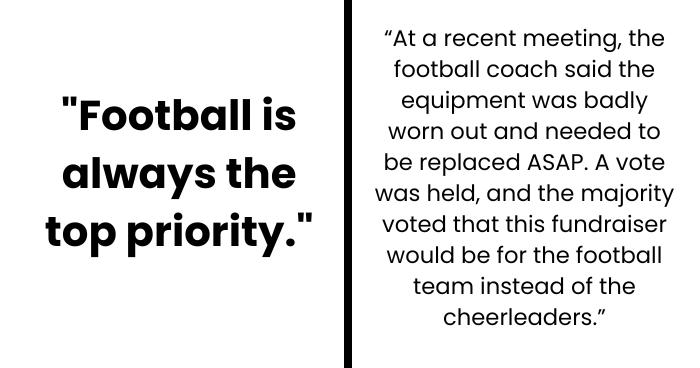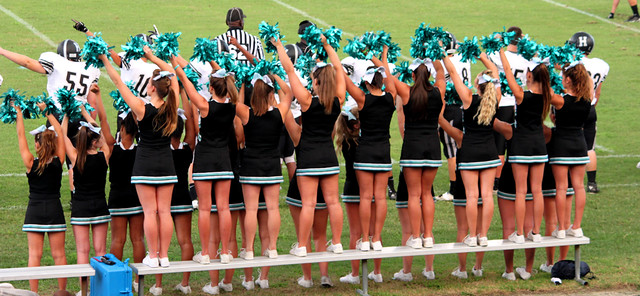AITA for screwing over all the people who donated their time and money?
The original poster (OP) committed their personal property and resources to host a PTA fundraiser aimed at providing new cheerleading uniforms, which were long overdue and eagerly anticipated by the cheerleaders, including OP’s child. Many individuals also contributed significant time, effort, and money to prepare for the event, all under the assumption it would benefit the cheerleading team. However, shortly before the event, a vote redirected the fundraiser’s purpose to benefit the football team, which claimed their equipment was critically outdated. Frustrated by football’s constant prioritization over other activities and feeling betrayed, OP withdrew their property as the venue, effectively jeopardizing the entire fundraiser.
The decision sparked outrage, with others accusing OP of disrespecting the majority vote and undermining their collective effort. Even some who opposed the vote believed OP’s withdrawal punished the wrong people and invalidated their contributions. OP acknowledges they burned bridges and may face expulsion from the PTA but remains firm in their stance, citing the disappointment and unfairness inflicted on the cheerleaders.
Read for more info Reddit
The PTA had been preparing for a fundraiser for months, so one father is livid after this plan takes a turn
The majority voted to buy new football equipment instead, therefore the man cancelled the event venue









The fundraiser was established to raise money for new cheerleader uniforms and the kids were excited about it
This situation embodies a classic ethical conflict: the individual’s right to control their contributions versus the community’s decision-making process. On one hand, OP’s withdrawal asserts their autonomy, particularly given the specific intent behind their contribution. On the other, their decision disrupts the collective efforts of many, raising questions about the fairness of their reaction.
1. The Principle of Donor Intent
The controversy centers on the concept of donor intent—a principle well-established in nonprofit and fundraising ethics. When individuals donate money, time, or resources, their contributions are often tied to specific causes. In this case, OP’s provision of their property and furnishings was explicitly tied to supporting the cheerleaders. The PTA’s decision to repurpose the fundraiser disregarded this intent, effectively changing the terms of OP’s agreement without consent. This aligns with legal precedents like Smith v. Nelson (2005), where courts ruled that donor contributions tied to specific causes could not be repurposed without donor approval.
2. Majority Rule vs. Stakeholder Engagement
The PTA’s vote reflects the democratic principle of majority rule but reveals the limitations of such a system in balancing the interests of minority stakeholders. While the vote determined the fundraiser’s new purpose, it failed to address the concerns of those who contributed under different expectations, particularly OP. Philosophically, this tension mirrors John Stuart Mill’s concept of “tyranny of the majority”, where democratic decisions can unjustly harm minorities when their interests are overridden without adequate consideration.
3. The Recurring Prioritization of Football
The context of football’s dominance adds a layer of social inequity to this situation. Studies show that high school and youth sports programs often disproportionately allocate funding and attention to football, leaving other activities like cheerleading underfunded. A 2019 report from the Aspen Institute’s Project Play highlighted this imbalance, noting that football programs receive 5–10 times the funding of other sports or activities in many schools. OP’s frustration reflects this systemic bias, where smaller programs are frequently sidelined despite their participants’ equal enthusiasm and need.
4. Community Impact and Fallout
While OP’s decision aligns with their personal values, it undeniably affects the broader community. The loss of a venue undermines months of effort and wastes contributions from others who worked on the assumption of shared goals. This raises the ethical question of whether OP’s withdrawal punishes the wrong people—volunteers and other contributors—rather than the decision-makers who voted to change the fundraiser’s purpose.
Redditors agreed this man had every right to refuse the venue and could have suggested the football field instead









OP’s withdrawal is not inherently “spiteful,” but it is a calculated stand against what they perceive as systemic unfairness and a breach of trust. While their decision emphasizes the importance of respecting donor intent and holding the PTA accountable, it also places collateral damage on well-meaning volunteers. This is a deeply polarizing situation, with valid arguments on both sides. Ultimately, OP’s refusal to support the fundraiser signals their unwillingness to enable further inequity, even at the cost of alienating their peers and disrupting the event.





